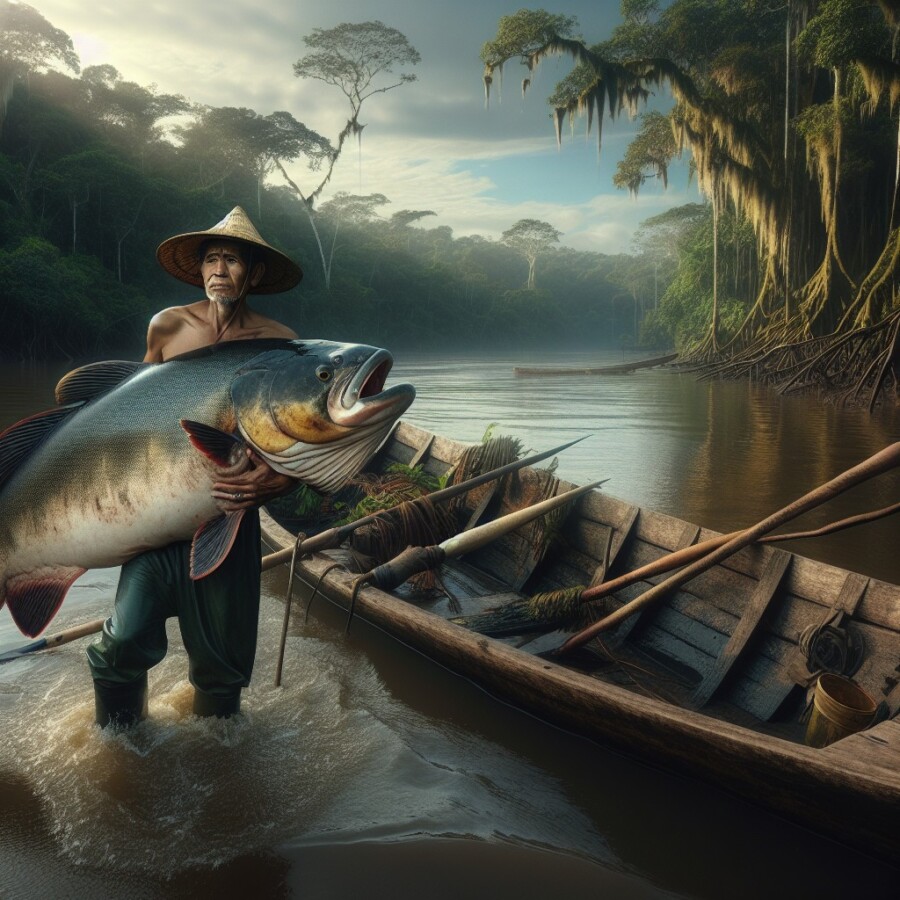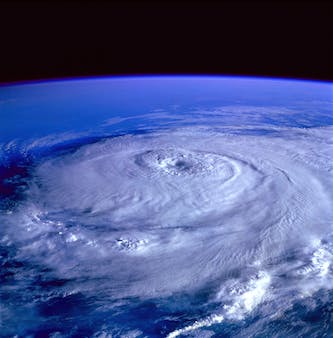A very big fish called the paiche is causing trouble in rivers in Bolivia. This fish can grow really long and heavy, and it scares away other fish that lived there first. The paiche came from a fish farm in another country when something broke. People who catch fish are seeing fewer of the fish they used to find, and experts are worried that the paiche will keep causing problems for the different kinds of life in the water.
But some people who catch fish are happy because they can sell the paiche. At first, they were scared of the big fish, but then they saw they could make money. In one town, they turn lots of paiche into food every month. Still, it’s hard to find the paiche because it likes quiet water and moves around a lot. Some people who lived there first are now catching and selling paiche too, which can lead to arguments.
People who study fish and those who catch them hope that by catching more paiche, they can stop there from being too many. They want to make sure there are still lots of different kinds of fish in the rivers. But it’s still a problem that the paiche is in places it shouldn’t be and that it’s making it hard for other fish to live there.
Original news source: The fish that eats piranhas for breakfast (BBC)
🎧 Listen:
Slow
Normal
Fast
📖 Vocabulary:
| 1 | paiche | A very big type of fish |
| 2 | causing | Making something happen, usually something bad |
| 3 | experts | People who know a lot about a certain thing |
| 4 | different | Not the same; not like others |
| 5 | farm | A place where animals or plants are grown for food |
| 6 | fewer | Not as many; a smaller number of something |
| 7 | problems | Things that make life hard or complicated |
| 8 | scared | Feeling afraid or frightened |
| 9 | arguments | Fights or disagreements between people |
| 10 | quiet | Not loud or noisy; peaceful |
| 11 | catching | Grabbing and holding onto something |
| 12 | making | Creating or forming something |
Group or Classroom Activities
Warm-up Activities:
– Charades
Instructions: Divide the class into two teams. Give each team a list of vocabulary words related to the article (e.g. paiche, fish farm, catch, sell, arguments). One person from each team will act out a word without speaking, and their team will try to guess the word within a time limit. The team with the most correct guesses wins.
– News Summary
Instructions: In pairs or small groups, have students take turns summarizing the main points of the article. Encourage them to use their own words and focus on the key information. After each summary, the other students can provide feedback and ask questions to ensure understanding.
– Opinion Poll
Instructions: Have students answer the following question individually: “Do you think it is a good thing or a bad thing that people can sell the paiche?” Once they have written their responses, have them share their opinions with a partner and discuss their reasons. Then, have a class discussion where students can share their opinions and listen to different perspectives.
– Vocabulary Pictionary
Instructions: Give each student a vocabulary word from the article (e.g. paiche, fish farm, catch, sell, arguments). Without speaking, each student must draw a picture to represent their word while the rest of the class tries to guess what it is. This activity helps reinforce vocabulary and encourages creativity.
– Pros and Cons
Instructions: Divide the class into two groups. One group will brainstorm the pros (advantages) of having the paiche in the rivers, while the other group will brainstorm the cons (disadvantages). After a few minutes, have each group share their ideas with the class. This activity encourages critical thinking and provides an opportunity for students to consider different perspectives.
🤔 Comprehension Questions:
1. What is the name of the big fish causing trouble in Bolivian rivers?
2. Why are some people happy about the paiche fish?
3. Why is it hard to find the paiche fish?
4. What do people who study fish and those who catch them hope to do?
5. Why is the paiche fish a problem for other fish?
6. Where did the paiche fish come from?
7. What can happen when people catch and sell paiche fish?
Go to answers ⇩
🎧✍️ Listen and Fill in the Gaps:
A very big fish (1)______ the paiche is causing trouble in rivers in Bolivia. This fish can (2)______ really long and (3)______, and it scares away other fish that lived there first. The paiche came from a fish farm in another country when something broke. People who catch fish are seeing fewer of the fish they used to find, and experts are worried that the paiche will keep causing (4)______ for the different (5)______ of life in the water.
But some (6)______ who catch fish are happy because they can sell the paiche. At first, they were scared of the big fish, but then they saw they could make money. In one town, they turn (7)______ of paiche into food every (8)______. Still, it’s hard to find the paiche because it likes quiet water and moves around a lot. Some people who lived there first are now catching and selling paiche too, which can (9)______ to arguments.
People who study fish and those who catch them hope that by catching more (10)______, they can stop there from being too many. They want to make sure there are still lots of (11)______ kinds of fish in the rivers. But it’s still a problem that the paiche is in places it shouldn’t be and that it’s making it hard for (12)______ fish to live there.
Go to answers ⇩
💬 Discussion Questions:
Students can ask a partner these questions, or discuss them as a group.
1. What is the paiche fish?
2. How do you think the paiche fish is causing trouble in the rivers in Bolivia?
3. How would you feel if you saw a very big fish in the water?
4. Do you think it’s good or bad that people can sell the paiche fish? Why or why not?
5. Do you like eating fish? Why or why not?
6. What do you think might happen if there are too many paiche fish in the rivers?
7. How do you think the paiche fish is affecting the other fish that lived there first?
8. What would you do if you caught a paiche fish?
9. Why do you think it’s hard to find the paiche fish?
10. How do you think arguments can start when people catch and sell paiche fish?
11. Do you think it’s important to have lots of different kinds of fish in the rivers? Why or why not?
12. What can people do to solve the problem of the paiche fish being in places it shouldn’t be?
Individual Activities
📖💭 Vocabulary Meanings:
Match each word to its meaning.
Words:
1. paiche
2. causing
3. experts
4. different
5. farm
6. fewer
7. problems
8. scared
9. arguments
10. quiet
11. catching
12. making
Meanings:
(A) Feeling afraid or frightened
(B) A very big type of fish
(C) Grabbing and holding onto something
(D) Not as many; a smaller number of something
(E) Not loud or noisy; peaceful
(F) Making something happen, usually something bad
(G) Fights or disagreements between people
(H) Creating or forming something
(I) Things that make life hard or complicated
(J) A place where animals or plants are grown for food
(K) Not the same; not like others
(L) People who know a lot about a certain thing
Go to answers ⇩
🔡 Multiple Choice Questions:
1. What is causing trouble in rivers in Bolivia?
(a) A small fish called the paiche
(b) A bird called the paiche
(c) A plant called the paiche
(d) A very big fish called the paiche
2. Where did the paiche come from?
(a) A fish farm in another country
(b) A fish farm in Bolivia
(c) The ocean
(d) The mountains
3. Why are some people happy about the paiche?
(a) They can eat it and enjoy the taste
(b) They can use it as a pet
(c) They can use it as bait for fishing
(d) They can sell it and make money
4. What kind of water does the paiche like?
(a) Quiet water
(b) Fast-moving water
(c) Dirty water
(d) Saltwater
5. What are people hoping to do by catching more paiche?
(a) Make the paiche happy
(b) Make the other fish happy
(c) Stop there from being too many
(d) Make money from selling the paiche
6. Why is it a problem that the paiche is in places it shouldn’t be?
(a) It eats all the plants
(b) It makes the water dirty
(c) It scares away other fish
(d) It is too big
7. What are people worried about regarding the paiche?
(a) It will become extinct
(b) It will keep causing problems for different kinds of life in the water
(c) It will become too small
(d) It will become too friendly
8. Who is catching and selling paiche now?
(a) Only the experts who study fish
(b) Some people who lived there first
(c) Only the people who catch fish
(d) No one is catching and selling paiche
Go to answers ⇩
🕵️ True or False Questions:
1. People who study fish and those who catch them hope that by catching more paiche, they can increase their population.
2. Some people who catch fish are happy because they can sell the paiche.
3. The paiche attracts other fish that lived there first.
4. People who catch fish are seeing more of the fish they used to find.
5. Experts are worried that the paiche will keep causing problems for the different kinds of life in the water.
6. There is a small fish called the paiche causing trouble in rivers in Bolivia.
7. It’s hard to find the paiche because it likes quiet water and moves around a lot.
8. The paiche came from a fish farm in another country when something broke.
Go to answers ⇩
📝 Write a Summary:
Write a summary of this news article in two sentences.
Check your writing now with the best free AI for English writing!
Writing Questions:
Answer the following questions. Write as much as you can for each answer.
Check your answers with our free English writing assistant!
1. What is the name of the big fish causing trouble in rivers in Bolivia?
2. Why are some people happy about the paiche fish?
3. Why are experts worried about the paiche fish?
4. What are some challenges in catching the paiche fish?
5. What do people who study fish and those who catch them hope to achieve by catching more paiche fish?
✅ Answers
🤔✅ Comprehension Question Answers:
1. What is the name of the big fish causing trouble in Bolivian rivers?
The name of the big fish causing trouble in Bolivian rivers is the paiche fish.
2. Why are some people happy about the paiche fish?
Some people are happy about the paiche fish because they can sell it and make money.
3. Why is it hard to find the paiche fish?
It is hard to find the paiche fish because it likes quiet water and moves around a lot.
4. What do people who study fish and those who catch them hope to do?
People who study fish and those who catch them hope to catch more paiche fish to make sure there are not too many of them.
5. Why is the paiche fish a problem for other fish?
The paiche fish is a problem for other fish because it scares them away and makes it hard for them to live in the rivers.
6. Where did the paiche fish come from?
The paiche fish came from a fish farm in another country.
7. What can happen when people catch and sell paiche fish?
When people catch and sell paiche fish, it can lead to arguments between the people who lived there first and the new people catching and selling paiche fish.
Go back to questions ⇧
🎧✍️✅ Listen and Fill in the Gaps Answers:
(1) called
(2) grow
(3) heavy
(4) problems
(5) kinds
(6) people
(7) lots
(8) month
(9) lead
(10) paiche
(11) different
(12) other
Go back to questions ⇧
📖💭✅ Vocabulary Meanings Answers:
1. paiche
Answer: (B) A very big type of fish
2. causing
Answer: (F) Making something happen, usually something bad
3. experts
Answer: (L) People who know a lot about a certain thing
4. different
Answer: (K) Not the same; not like others
5. farm
Answer: (J) A place where animals or plants are grown for food
6. fewer
Answer: (D) Not as many; a smaller number of something
7. problems
Answer: (I) Things that make life hard or complicated
8. scared
Answer: (A) Feeling afraid or frightened
9. arguments
Answer: (G) Fights or disagreements between people
10. quiet
Answer: (E) Not loud or noisy; peaceful
11. catching
Answer: (C) Grabbing and holding onto something
12. making
Answer: (H) Creating or forming something
Go back to questions ⇧
🔡✅ Multiple Choice Answers:
1. What is causing trouble in rivers in Bolivia?
Answer: (d) A very big fish called the paiche
2. Where did the paiche come from?
Answer: (a) A fish farm in another country
3. Why are some people happy about the paiche?
Answer: (d) They can sell it and make money
4. What kind of water does the paiche like?
Answer: (a) Quiet water
5. What are people hoping to do by catching more paiche?
Answer: (c) Stop there from being too many
6. Why is it a problem that the paiche is in places it shouldn’t be?
Answer: (c) It scares away other fish
7. What are people worried about regarding the paiche?
Answer: (b) It will keep causing problems for different kinds of life in the water
8. Who is catching and selling paiche now?
Answer: (b) Some people who lived there first
Go back to questions ⇧
🕵️✅ True or False Answers:
1. People who study fish and those who catch them hope that by catching more paiche, they can increase their population. (Answer: False)
2. Some people who catch fish are happy because they can sell the paiche. (Answer: True)
3. The paiche attracts other fish that lived there first. (Answer: False)
4. People who catch fish are seeing more of the fish they used to find. (Answer: False)
5. Experts are worried that the paiche will keep causing problems for the different kinds of life in the water. (Answer: True)
6. There is a small fish called the paiche causing trouble in rivers in Bolivia. (Answer: False)
7. It’s hard to find the paiche because it likes quiet water and moves around a lot. (Answer: True)
8. The paiche came from a fish farm in another country when something broke. (Answer: True)
Go back to questions ⇧















